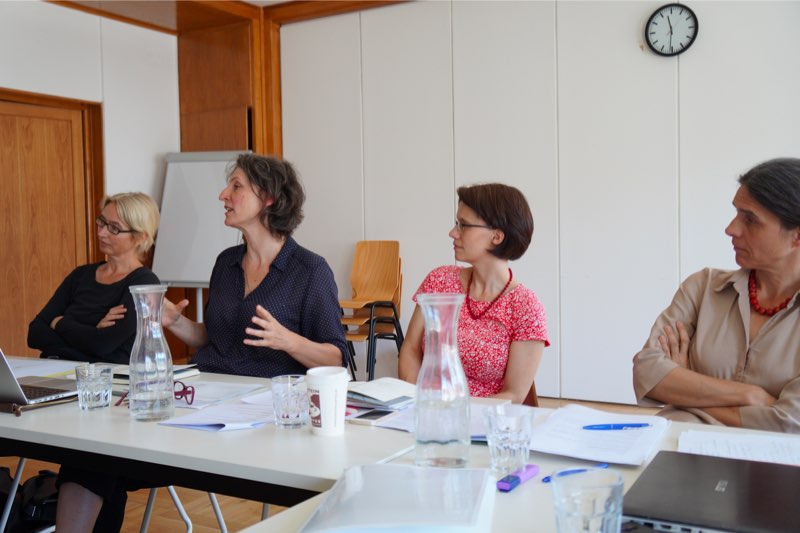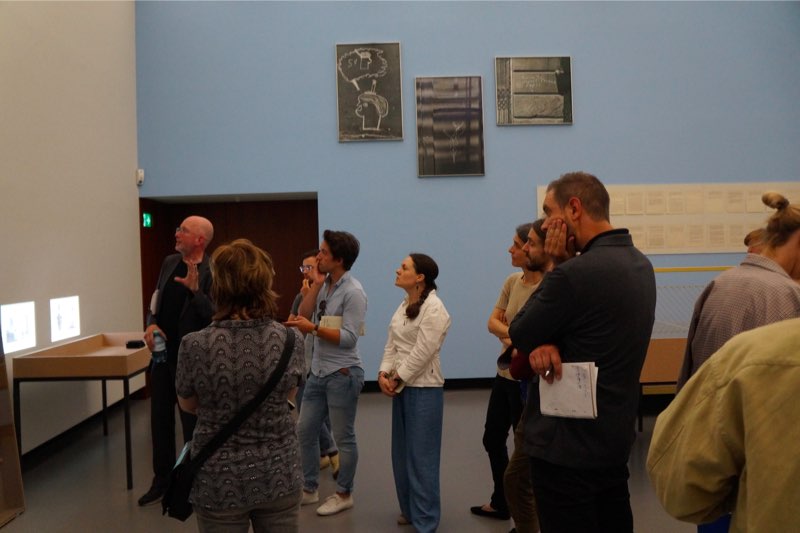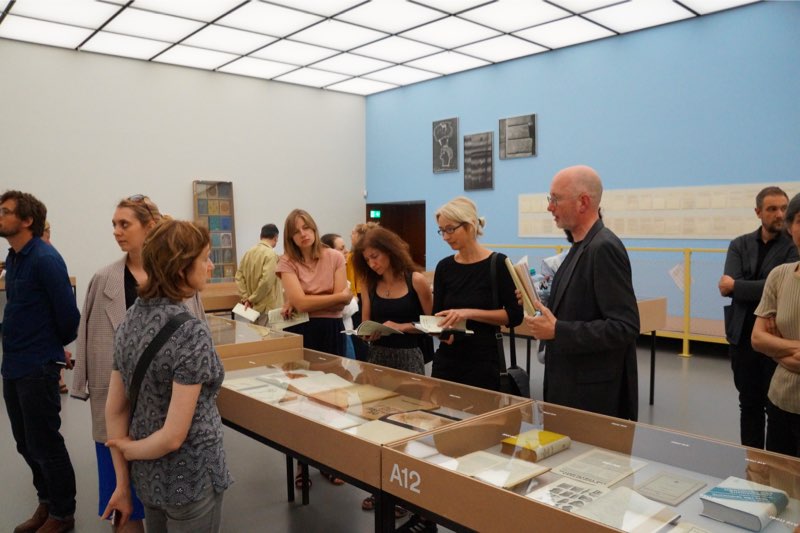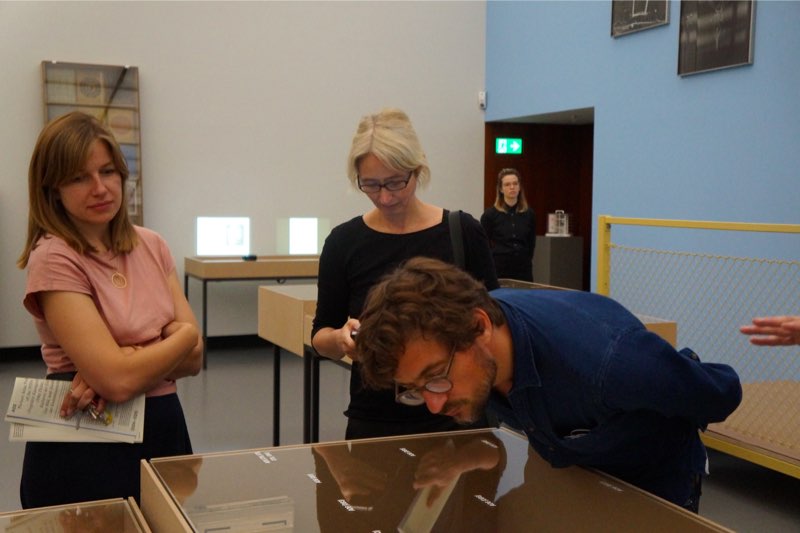From the brothers Humboldt to Jacques Chirac and back …
A report from the three-day work shop: Exchanging perspectives: anthropologies, museum collections and colonial legacies between Paris and Berlin (June 6-8, 2018) held at the Centre for Anthropological Research on Museums and Heritage (CARMAH) and at the Haus der Kulturen der Welt (HKW)
It was at the recently renamed ethnography museum in Hamburg (formerly Museum für Völkerkunde, today Museum am Rothenbaum, Kulturen und Künste der Welt) that a meeting was organized on the 18th of May, 2018 by the German Ministry of Foreign Affairs and the Goethe Institut with the rather long and awkward title: From “Frosty Deposits of White Thirst for Knowledge” Towards Things and Wisdom without frontiers. Taken from an expression used by the German intellectual Carl Einstein in 1926 (“Das Berliner Völkerkunde-Museum. Anläßlich der Neuordnung”, published in Der Querschnitt), it refers to an early critique of Berlin’s ethnographic collections as trophies of white greed and it was published shortly before the author moved to Paris where he was to be famously part of the unique intellectual enterprise of George Bataille’s Documents. A policy meeting referencing transgressive critical thinking, may in itself be remarkable, but it was also designed to examine how German institutions might react to African claims for restitution by bringing together major actors from the German institutional landscape with African museum professionals mainly though not exclusively from former German colonies. It was clearly framed in the opening remarks as an effort to react to the November 2017 speech, made in Ouagadougou by French president, Emmanuel Macron and his self-imposed challenge to provide the conditions for a restitution of African heritage from French and even European museums. Invited but not present at the meeting in Hamburg was the French art historian, Bénédicte Savoy, who has spent most of her career teaching at the Technische Universität in Berlin, and who together with Senegalese intellectual Felwine Sarr has been mandated with producing a report to engage this initiative in France. After providing fuel for the lively debate on the state of provenance research in Germany’s ethnographic collections and in particular in provision of the establishment of the Humboldt Forum, her nomination by Macron is exemplary of transnational emulation and mirroring, where individual actors move between national contexts of policy making and contribute to rhizomatic resurgences of critical discourses. Such constellations also exemplify the context that the authors of this report wanted to address by organizing the workshop discussed here. By bringing together several research groups involved in considering the implications and differences in how colonial legacies are dealt with in Paris and Berlin, between the creation of Jacque Chirac’s Musée du Quai Branly (opened in 2006) and the debates concerning the Humboldt Forum (set to open in 2019), the focus was particularly but not exclusively on ethnographic collections and anthropological knowledge production.
The aim was mainly to consider how the very rapid and recent changes in discourses and practices linked to notions such as “provenance”, the “postcolonial/decolonial”, or “the ethnographic” unfold in different institutional contexts in both cities. It was considered on the one hand as related to issues of representation, essentially a question of who speaks where and more specifically how historic and contemporary anthropological knowledge production is made, reflected and/or performed in exhibitions. How is anthropological thinking today positioned in relation to the history of anthropology? How can its considerations be mediated for a wider public in contemporary cultural institutions? Underlying our discussions of course was the imperative to think about the methods that we might use in structuring our answers to such questions: in essence, how to map, document, compare, and analyse the current developments that are changing our own fields of practice?
 Photographer: Callum Fisher.
Photographer: Callum Fisher.
The first day, held at CARMAH, was dedicated to comparative observations of the highly political and politicized environment in which debates around contested collections and colonial memories have evolved in the past years. Beginning with the pragmatics of provenance research and restitution negotiations, the first panel sought to understand the very different strategies in action on these issues, whether it be in relation to cultural artefacts or human remains. Christine Howald and Felicity Bodenstein used their observations and interactions with African and East Asian collections and curators to discuss the different uses and connotations of the terms provenance/Provenienz and art pillé/(Koloniale) Raubkunst (or looted art) in colonial contexts. It appeared quite clearly that “provenance” has a different impact in public discourse in Germany, in contrast to France where it is a term used by the market and by connaisseurs mainly as a positive notion that defines the pedigree of an object through its ownership history. In Germany it is perceived largely as a moral requirement and historical practice related to clarifying questions of Raubkunst. Additionally, in the French context there appears to be an immediate political will for restitution with a discourse that does not set out the practice of provenance as a prerequisite. In discussions, the prevalence of the provenance paradigm in Germany was also considered as potentially problematic in so much as it may tend to background other important problematics related to ethnographic collections, such as complex issues of colonial legacies, and cultural entanglement. Whilst the instrumentalization of provenance at a political level was discussed as a potential problem for ethnographic museums, it is also an opportunity for funding museums and institutions, though care should be taken to avoid side lining other perspectives.
The contrast to Germany with the strong centralized role of the French political system was made obvious in Damiana Otoiu’s paper who provided a multi-sited examination of the restitution of human remains from France to South Africa. Restitution processes are characterized by a priority given to political agents, whose “moral” or “ethical” claim often contrast with legal constraints and the positions of museum professionals. Discussing the South African case she suggested that restitution does not necessarily lead, as is often claimed, to the empowerment of so-called source communities but can, on the contrary, be used by the involved political parties to focus on national prerogatives, rather than on indigenous rights. In the following discussion, differences in the legal status of museum artefacts between France and Germany were underlined. Until now, restitutions in France have been characterized by their specific case by case treatment, designed to avoid as much as possible the creation of a (legal) precedent applicable to all collections in France, which are characterized by their inalienability. In Germany, however, the situation is different because every collection is administered and owned according to legal frameworks that differ from one Bundesland to another, and, before the Kulturschutzgesetz of 2016, the deaccessioning of museum objects was relatively easy.
 Photographer: Callum Fisher.
Photographer: Callum Fisher.
Representation of Culture(s)
Annette Bhagwati presented the institutional history of the HKW as a history of exhibitions, a history characterized by its “paradigmatic changes, conceptual shifts, programmatic and methodological turns” since its foundation in 1989. She basically defined three different stages in the HKW’s history. Starting with the attempt to embrace multiculturalism, to enlarge and challenge the Western canon, she described the 1990s as a period of “discovery” of the different arts of the world “out there”, a multidisciplinary exploration of “world art”, “world music”, etc. With time, this approach was criticized for its exoticism, and for failing to take into account the theoretical contributions of postcolonial critique. With this critique in mind, the 2000s were, on the one hand, shaped by an attempt to redefine the notion of “contemporary art”, both on an artistic and curatorial level. This resulted in a number of exhibitions with a focus on contemporary art from specific regions, such as India or the Middle East. On the other hand, certain exhibitions focused on entangled histories, such as Black Atlantic (2004), which attempted to translate Paul Gilroy’s seminal book into an exhibition adapted to the German context. The approach of entanglement and the orientation toward a “research- and process-orientated” institution, has, however, created new forms of exclusions, which Bhagwati addressed in her afterthoughts, but which also came up in the discussion. How to make theoretically complex issues accessible to diverse audiences? What is defined as expertise and how does it find its way into academia? Another question concerned the institutional positioning of the HKW, both in Berlin and on an international scale. As Susanne Leeb highlighted, the institution is unique in the sense that it doesn’t come with the constraints of material collections which “are somehow really sticky” and difficult to deal with.
 Photographer: Callum Fisher.
Photographer: Callum Fisher.
Transformations of the Ethnographic in Berlin
Larissa Förster, Jonas Tinius and Margareta von Oswald presented their common research in Berlin, which is subsumed under the title “Transforming the Ethnographic” and part of the larger project based at CARMAH, “Making Differences in Berlin – Transforming Museums and Heritage in the 21st Century” (2015-2020). They introduced their respective research axes through ethnographic vignettes and observations of recent developments concerning ethnological museums and collections, the discourse, as well as the political and curatorial practices concerning German colonialism. This allowed them to contextualise current negotiations concerning this topic, departing from the developments within and around the Humboldt Forum and its collections. Larissa Förster questioned the relationship between the debate on restitution and provenance and resumed her impressions in stating that France was in favour of an “in order to”-approach (returns in order to make African cultural heritage accessible in Africa), while Germany rather supported a “because of”-approach (returns because they were acquired illegitimately). Margareta von Oswald invited the workshop’s participants “behind the scenes” of the museum. She focused on the ambivalence of curatorial positionings in complex and hierarchical constellation of institutions, unravelling the oftentimes conflicting interests of the diverse stakeholders involved. By depicting a scene within the museum’s walls in 2013, she reminded the audience of how at the time, the request at the museum by activists and academics had not been how but rather if colonialism was going to be addressed in the Humboldt Forum’s permanent exhibition. Equally departing from curatorial queries, Jonas Tinius looked at the development of a colonial archive outside of major museum institutions, namely at SAVVY Contemporary, discussing the effect of “awkwardness” produced by the objects integrated into the archive. The three researchers shared methodological reflections on the collective ethnography of Berlin’s museumscape, which the “Making Differences” project is currently applying. They raised questions concerning the role of the anthropologist between activism, academic knowledge production, and politics, leading to a discussion about the different scales at which such an ethnography could operate, and finally, how to make such intimate insights ethically tenable and analytically productive. Duane Jethro, equally a part of CARMAH, gave an insight of his ethnography on activism and the changing of street names in Berlin. Certain street names have been considered offensive because of their racist designation (such as the M*Straße in Berlin-Mitte) or the celebration of colonial officers and explorers (such as the “Gröbenufer”, changed in May Ayim Ufer in 2009). Qualifying the processes of street name changes as tying race, memory and identity politics together, Jethro reflected on the possibilities of decolonisation in Berlin as a former colonial metropole.
 Photographer: Callum Fisher.
Photographer: Callum Fisher.
In their concluding remarks, Dominique Poulot and Sharon Macdonald came back to the question of what and how to compare, as well as how to document and analyse current developments in the field of heritage and museums. Macdonald listed the different levels on which comparison had taken place during the day, such as the difference in legal systems, institutional and political structures, as well as linguistic choices (heritage / Denkmal / patrimoine). She insisted on the importance of a micro-analysis, scaling down, arguing in particular for ethnographies of these processes. She equally highlighted the importance of scaling up, however, and both Poulot and Macdonald discussed Michael Rothberg’s concept of multidirectional memory (2009) to understand and embed the current developments around colonialism in Europe[1]. In which way can one relate memory practices of the NS regime to current developments? Why now the big emphasis on colonialism across Europe? And especially colonialism in Africa? Was this a new way of being European? What does colonialism do today in relation to heritage institutions? How do ideas on and approaches to colonial legacies circulate between different European contexts and museums, as well as through cooperations with the Global South?
Anthropological Representation / The Representation of Anthropology
Moving away from how museums today have to deal with the material legacy of colonialism, a more theoretical approach came to the forefront of discussions following the visit led by Thomas Holert, to the exhibition currently presented the HKW, Neolithic Childhood – Art in a False Present, ca 1930. Indeed, the second part of the workshop, dealt with contemporary exhibitions that revisit a late nineteenth, early twentieth century turn to gathering material culture on a more intensely global scale. The discussion was lead by reflections on the HKW exhibition where the “impossible expansion of History” was dealt with in the first section, and where the world as an excavation ground appears as the metaphor of the display concept in the second room of the exhibit. The key orientation points in the exhibition itself were the issues voiced by the generation of intellectuals that Einstein was part of in the 1930s (many moving between France and Germany): the aim to produce a “world art history”, or the desire to find alternatives to contemporary living in pre-historic societies, or societies “elsewhere”, studied and theorized by archaeologists and anthropologists – expressing positions that have been both inspiration for and subject to critique. These have provoked the establishment of a discursive apparatus that has since made cyclical reappearances and produced reformulations that run into contemporary curatorial and artistic practices, at the centre of the second part of the workshop.
Different interventions looked at how to exhibit and challenge archives linked in some way or another with anthropological knowledge production. Departing again from the HKW exhibition, which focused on, but was not limited to the figure of Carl Einstein, the examples ranged from Kader Attia’s and Jean-Jacques Lebel’s recent exhibitions in Paris’ Palais de Tokyo, the travelling exhibition dedicated to the anthropologist Leo Frobenius to an exhibition on Sergei Eisenstein’s film productions. In view of exhibitions in Paris, and their negotiation of the imbrications of anthropology and colonialism, Anna Seiderer exemplified what she phrased as “the migration of the ethnological into the Parisian art scene” with Kader Attia’s and Jean-Jacques Lebel’s recent exhibitions at the Palais de Tokyo. Whereas Seiderer’s account demonstrated the multitude and diversity of approaches to colonialism in Parisian art institutions, Benoit de L’Estoile showed how in Paris’ major museum institutions, such as the Musée de l’Homme, or the Musée du Quai Branly the denial, omission and downplaying of colonial histories still persists.
The day ended with a presentation of the Qumran publishing house, whose archives have recently been acquired by the HKW. Recurrent questions concerned the specific role of the HKW as a translator of academic research into exhibition formats, which, as Margareta von Oswald put it, resulted for some in the simultaneous experience of profound fascination and frustration. As part of the scientific advisory board of the exhibition, Irene Albers came back to the question of academic expertise and its integration in the exhibition. She stressed the discrepancy between recent research on the history of anthropology, which generally highlights the national specificity and singularity, and the curatorial strategies of the HKW, which she characterized as “deterritorializing”, focused on larger reference frames, such as “modernity”, “capitalism”, or “ethnography”. All of the presentations had in one way or another considered the representation of anthropology through the archive. As Bernd Scherer, director of the HKW noted, it was necessary to consider these contemporary practices in order to approach possible futures – the seeds of which can be discovered in that exploration of the past that is not prescriptive but open.
Author Biographies
Felicity Bodenstein’s research focus is on the history of archaeological and ethnographic collections. Since 2017, she has been part of the project „translocations – Historical Enquiries into the Displacement of Cultural Assets” (Technische Universität Berlin) with her research project “A Twentieth Century History of Absence and Presence in Benin City: Presentations and Representations of Objects Looted in 1897″. Her principal case study concerns the so-called Benin bronzes and the visual, narrative, and interpretative changes made by museums to their display in the past few decades.
Callum Fisher is a student of the European Masters on the Dynamics of Cultural Landscapes and Heritage Management. Currently based at the Centre for Anthropological Research on Museums and Heritage in Berlin, he is working on the EU Horizon 2020 funded TRACES project, addressing the contentious heritage of collections of human remains held in European museums. His research explores visitor engagement with contested colonial histories in museums.
Margareta von Oswald is a doctoral fellow in anthropology at the Centre for Anthropological Research on Museums and Heritage, Humboldt-Universität zu Berlin, and at the École des Hautes Études, Paris. Analyzing two major museum restructuration processes (Berlin’s Ethnologisches Museum in the Humboldt Forum; Tervuren’s Royal Museum of Central Africa), her research deals with the negotiations of contested colonial legacies in the present. In 2015, she curated the exhibition Object Biographies with Verena Rodatus (Humboldt Lab Dahlem, Berlin).
––––
[1] Multidirectional Memory situates Holocaust memory in the context of decolonisation. Rothberg analyses in which ways the public memory of the Holocaust has enabled, negotiated, or challenged other histories of victimization.

































